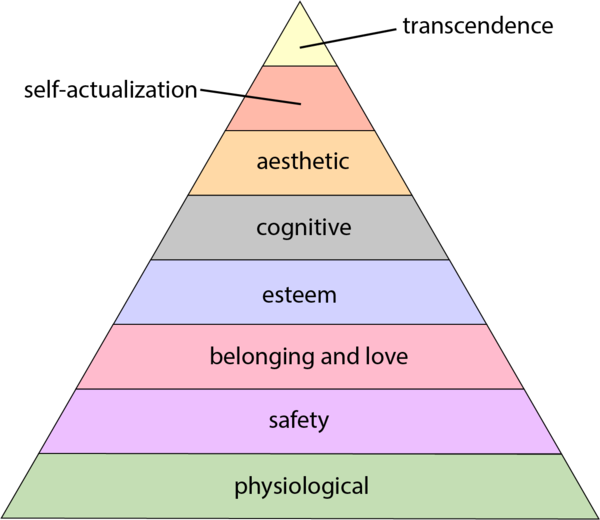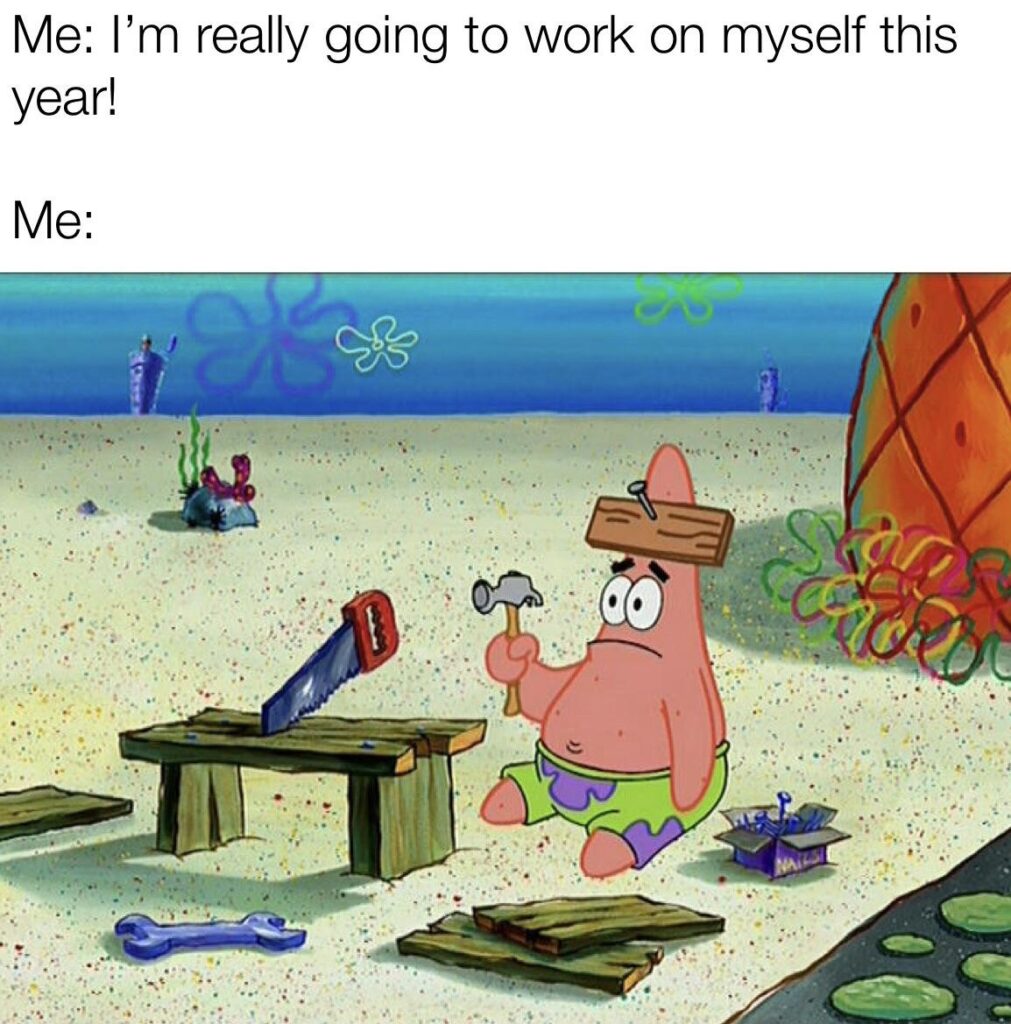Why, for those of us first worlders who, ostensibly all least, have all of our needs met, does life seem so hard sometimes? If we look at Maslow’s hierarchy of needs (illustrated below), money can only really buy us the base – ‘physiological needs’. One out of eight down. ‘Safety’ encompasses health, personal security, emotional security and financial security. Middle-class money can support, but not guarantee, health or even financial security. It can enable, but not ensure, that you improve your personal security in that you may be able to afford escaping insecure circumstances. It certainly cannot buy you emotional security, or by extension the remaining of the pyramid stages, which, according to Maslow, are contingent on the supporting lower stages:
Maslow used the terms “physiological”, “safety”, “belonging and love”, “social needs” or “esteem”, “self-actualization” and “transcendence” to describe the pattern through which human needs and motivations generally move. This means that, according to the theory, for motivation to arise at the next stage, each prior stage must be satisfied by an individual.
Wikipedia

If you are reading this post, you can likely be categorized among the richest 1 billion people on earth, somebody in a Level 4 income level, according to this framework devised by Gapminder. By their standards, this means that you earn at least $32 per day. If you take a minute to divide your monthly income by 30, you will probably find that you earn significantly more than that. However, this prime economic status does not protect us from outside influences that can deprive us of safety, belonging and love; or support our growth in terms of esteem (self-respect and respect from others), cognition (meaning, information, comprehension and curiosity – learning and attaining knowledge), aesthetics (the ability to appreciate the beauty within the world around one’s self – to beatify one’s surroundings and one’s self), self-actualization (“What a man can be, he must be.” – the realization of one’s full potential), and transcendence (the fullest realization in giving oneself to something beyond oneself—for example, in altruism or spirituality). We still suffer from trauma, insecurity, loneliness, self-deprecation, creative depravation, detachment from all the good things in life, and a grumbling sense of powerless discontentment as to how our lives have turned out. Oof.

The question I’m posing in this post is a precarious one: how does the Buddhist dogma that we are the cause of our own suffering fit with the inevitable influence of external factors in our efforts to climb Maslow’s ladder, to be happy? These ‘external influences’ include trauma, the capitalism that uses people like machines and discards them when they malfunction, the patriarchy that treats women as objects to be owned and enjoyed, the racism/ableism/homophobia/transphobia/sexism that steps on everybody but the white western man, the ‘pretty privilege’ that favors the young and beautiful, the couple privilege that favors those who follow the relationship rulebook of monogamy, heterosexuality and marriage. Given these influences, much of the Level 4 income world is not conducive to personal safety, in particular for BIPOC people, queer folk, unable people, people suffering from addictions or disease, and women. Almost everybody has trauma to different degrees, be it “little t” (e.g. an undercurrent of neglect from inattentive parents during childhood) or “big T” (e.g. one or more intensely traumatizing events in one’s life), which can perturb self-esteem and emotional security. Our system of isolated homes, gated neighborhoods and mistrust of strangers do not generally cultivate a sense of community, belonging and love.
Despite all of these uncontrollable, oppressive circumstances most of us stumble into, Buddhism cuts through the complexity and claims that these influences inflict pain, but that we can choose whether we suffer from it or not. Do we need to live in community to feel love and belonging, or can we simply let go of our attachment to love from others? Do we need the sense of achievement, good looks and external validation to feel esteem, or can we let go of this attachment too? I surmise that the lower stages – physiological, safety, love and belonging – cannot be labeled as desires and bypassed by just letting them pass through the sky of our psyche. But I wonder how much of the suffering experienced for unfulfillment of the higher stages is self-inflicted, and how much could be avoided if we just… ceased to inflict. The paradox I attempt to explore here is the suffering we inflict on ourselves in our misguided efforts to feel good, to fulfill our needs, and to be happy.
If I think of my own suffering, it is always a consequence of my entertaining and engaging with self-harming thought patterns and behaviors. Thoughts, feelings, memories, fantasies and urges are an amalgamy of mental clouds, lightening bolts, gusts and static that come into being without permission or forewarning, and dissipate in their own time. By ‘entertaining’, I mean assigning value to these mental weather fronts – believing that they have a power over me, that the messages they hold are reflective of a truth, that I am helpless once they arise, that these uncomfortable feelings are going to hurt, and that it is inevitable that I will be consumed by this storm. ‘Engaging’ means submitting to this helplessness, opening my door and walking into the storm. This looks like spiralling into hot and racing thought loops, or “acting out” self-harming behaviors. It may well be that the spark that lit these practises – the ‘external influences’ I discussed above – was completely outside of my control, but they only flare and continue to burn because I fuel them every time I engage with them. Some parts of myself believe that entertaining (assigning value to) and engaging with (diving into) particular thought patterns and behaviors will make me hurt less and be more happy, but in actuality just engender more suffering. Some choice previous and current sources of suffering of my own include:
- Suffering that comes from entertaining the idea that cravings reflect a true need, have the power to influence my actions, and proceeding to engage in the self-harming behaviours the cravings fixate on:
- skin-picking
- binge-eating
- food restriction and weight-tracking
- Suffering that comes from attachment to a fictional version of ourselves, based on the illusion that our happiness is conditioned on us realizing this alternative self, this alternative life.
- pining for a younger, more able, more successful, more admired version of myself
- vying for perfection, ‘clean-streaks’ of ideal behaviors e.g. consistent running, fully-focused 60-hour workweeks, abstinence from bad habits
- yearning for materialistic goals: accelerated graduation, stellar race performances, leadership roles in my career, silly salaries
- frustration with myself for continuing to entertain and engage with self-harming thought patters and behaviors when I know that I have the choice to ground myself and detach from them. Acting on cravings is one kind of self-harm, but chastising myself for acting on them, spurred by an attachment to a perfect self, is further self-harm.
The intrusive thoughts that I listed above are just that – worn out thought patterns that I compulsively engage in, feeding them with a virtual power and feeling consumed by the feelings they invoke. These are examples from my own life, but we all have our wounds and the demons they spawned. It is tiresome to expend so much mental energy on all of these turbulent and undesirable thoughts, feelings and urges: ruminating on them, acting on them, despairing that we must feel these terrible things. But while these mental storms will inevitably come into being, I believe in the Buddhist affirmation that we can choose whether to run out into the eye of the storm and suffer, or to watch through the window of our cosy home. The thoughts will come, whether we engage with them is up to us. For those of us whose physiological needs are met, the pain of underhand and stray punches from this imperfect and injust world we live in are inevitable. But perhaps more of our suffering is self-inflicted than we know. More hopeful yet, perhaps we have choice in entertaining the compulsions towards self-inflicted suffering, and in acting on them. Maybe if we see that clinging to these worn-out habits isn’t serving us, we can release our grip and amble on towards self-actualization and transcendence.
Friend, I know that you are suffering, and I hope that you and I both can learn to recognize the storm clouds of pain that pass through our mental sky through, to acknowledge that they are real without repressing them, but to suffer less by choosing to stay inside the safety of our homes and observe through our window until the storm passes. Align yourself to rewire your brain and your habits for good, and let go of the voices that chastise you when you fall short. Love yourself exactly as you are and let go of any thoughts that tell you otherwise. You may suffer, but try not to suffer at your own hands.
x A
Leave a Reply